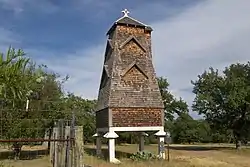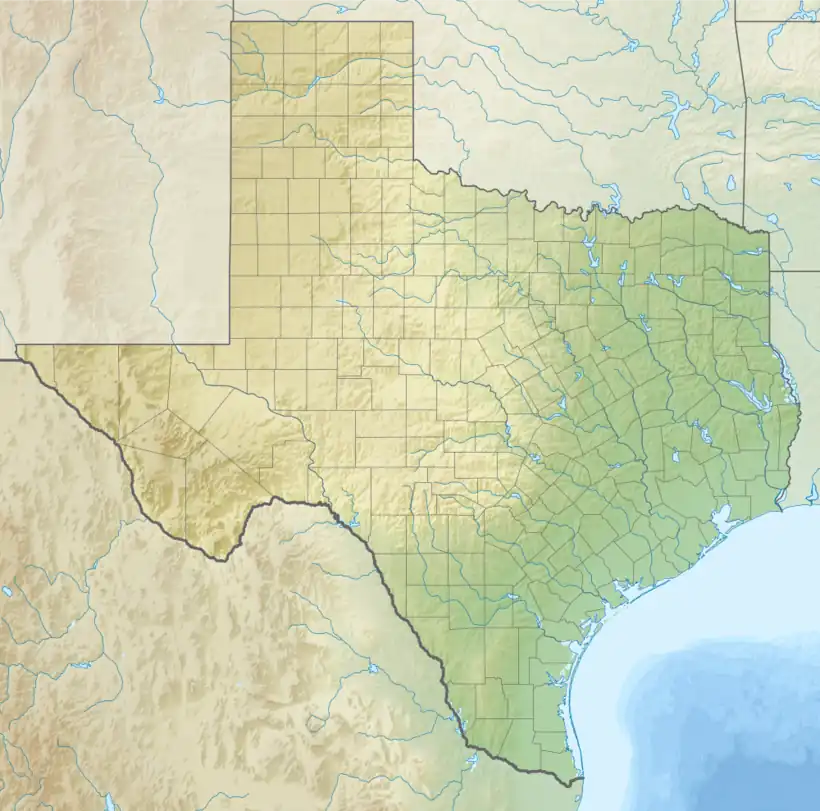Hygieostatic Bat Roost | |
 Hygieostatic Bat Roost in 2009 | |
 Hygieostatic Bat Roost  Hygieostatic Bat Roost | |
| Nearest city | Comfort, Texas |
|---|---|
| Coordinates | 29°58′13″N 98°53′5″W / 29.97028°N 98.88472°W |
| Area | less than one acre |
| Built | 1918 |
| Architect | Charles A. R. Campbell |
| NRHP reference No. | 83003144[1] |
| RTHL No. | 2608 |
| Significant dates | |
| Added to NRHP | March 28, 1983 |
| Designated RTHL | 1981 |
The Hygieostatic Bat Roost is located in Kendall County, approximately 1.5 miles (2.4 km) east of Comfort on the south side of RM 473, in the U.S. state of Texas. It was erected in 1918 on property owned by former San Antonio Mayor Pro Tem Albert Steves, who had commissioned San Antonio health officer Dr. Charles A. R. Campbell to design the structure. The shingled pyramid-shaped raised tower stands 30 feet (9.1 m) high. One dormer serves as an entrance for the bats, while the other dormers are ornamental. The lower portion of the tower allows access for humans. The concrete base of the tower is raised 7 feet (2.1 m) off the ground, facilitating wagons being driven beneath to collect the guano.[2]
Campbell had been researching a method of controlling the spread of mosquito-carried malaria, by encouraging the insect's natural enemy, the bat. Although mosquitoes have other natural enemies, many of them are active only during the daytime hours, while bats fly in search of food during the night when mosquitoes are most active.[3] Campbell patented his bat roost design and erected several of them in the San Antonio area beginning in 1907. When the bat roost was built on his Kendall County property, Steves coined the name Hygieostatic Bat Roost based on the Greek words hygiea (health) and stasis (standing). The descendants of Albert Steves still own the property where the tower is located.[4] It was designated a Recorded Texas Historic Landmark in 1981.[5] In 1983, the roost was added to the National Register of Historic Places.[2]
See also
References
- ↑ "National Register Information System". National Register of Historic Places. National Park Service. July 9, 2010.
- 1 2 "NRHP Hygieostatic Bat Roost". Texas Historical Commission. Retrieved September 30, 2014.
- ↑ "10 Common Questions about Bat Houses". The Old Farmer's Almanac 2015. Old Farmer's Almanac. 2014. ISBN 978-1-57198-639-9.
- ↑ Beeman, Cynthia J. (2013). History along the Way: Stories beyond the Texas Roadside Markers. Texas A&M University Press. pp. 32–34. ISBN 978-1-60344-769-0.
- ↑ "RTHL Hygieostatic Bat Roost". Texas Historical Commission. Retrieved September 30, 2014.
External links
![]() Media related to Hygieostatic Bat Roost at Wikimedia Commons
Media related to Hygieostatic Bat Roost at Wikimedia Commons


